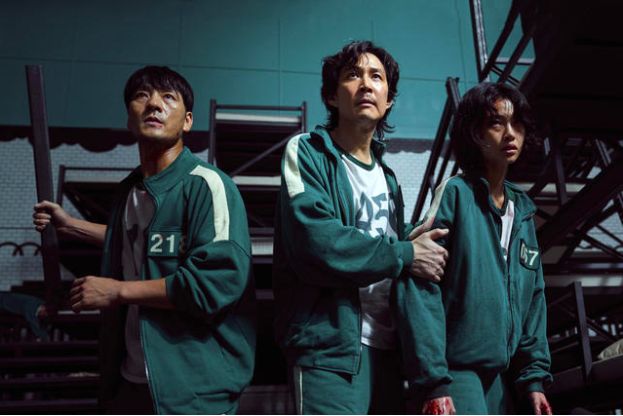Review of Netflix’s newest hit: “Squid Game”
“Squid Game” is a South Korean drama series directed and written by Hwang Dong-hyuk. It came out on Netflix on September 17, 2021 and is now the most watched series at launch on Netflix ever with 110 million views in the first 17 days of its release.
The show centers around a tournament of six children’s games, played by people who are in a severe debt. They must win all six games in order to obtain the prize money: 45.6 billion Won (38 million USD).
However, there’s a sinister twist. If a player loses and is eliminated, they are killed. In order to win the prize money, you need to be at your sharpest wit and highest strength in order to beat all of the games and escape death. The series follows Gi-hun, the protagonist, as well as a few other main characters and how they navigate the games towards victory.
This review will contain spoilers for the entire series. It’s a must-watch and is experienced the best going in as blind as possible.
“Squid Game” was filled with a variety of characters, each with their own personal and intriguing story. There’s Gi-hun who had a gambling addiction and failed to be a good father for his daughter who he doesn’t live with anymore.
Sang-woo was another player in the games that’s perceived as a genius because he graduated from one of the most prestigious schools in South Korea. However, he’s extremely in debt and can’t escape the disappointment he brought to his mother. He’s calculated and cold, two of the most valuable assets in the games.
Sae-byeok’s story began when her family escaped from North Korea, separating themselves and leaving Sae-byeok with her little brother. The reason she chose to participate in the games was to win the money to bring back her surviving family and unite them again. She’s a pickpocket, and like Sang-woo, cunning.
Jun-ho gave the viewer an entirely new perspective of the story, as he’s a police officer who infiltrated the headquarters of the games in search of his missing brother. His plotline was crucial for worldbuilding and understanding the logistics behind the games.
Other characters such as Ali, the old man, and Deok-su gave the cast even more intrigue and uniqueness. Each character went through their own arc that left viewers in tears multiple times. The viewer truly feels the pain each of them experience, even if certain characters are more likeable than others.
It’s hard to get so attached to these characters when they’re in a perilous situation like this because of the death flags surrounding them at every turn. This lets “Squid Game” keep you at the edge of your seat the entire time, hoping your favorite character didn’t bite the dust in the upcoming game.
The death-games they’re forced to compete in are entertaining and creative by putting their own spin on it. Most of the games were based upon South Korean children’s games, such as Tug-O-War and Red Light Green Light, the latter of which viewers were thrusted into the very first episode.
The way a seemingly innocent game was quickly turned into a living nightmare as participants who lost were shot down was a sheer—and darkly humorous—juxtaposition.
The show’s usage of juxtaposition also amplified its thematic content. The show was based around the idea that capitalism exploited people into going to their darkest depths just to get by, all while the top percent watched on in glee.
This rich and socially-relevant commentary was masterfully done, and exposed viewers to the potential dystopian horrors of a capitalist society gone too far.
“It’s an overall excellent critique of capitalism and by extension, the entirety of western civilization,” explained Hills senior Alan Zhang.
The highlight of the series came in episode six, which was a masterpiece in its storytelling and emotion. Before they knew about the game, the players were asked to pick a partner.
Their logic had been twisted because of the previous game they played: Tug-O-War—which requires teaming up with the strongest and sharpest players. So, we had the main characters pair up with the people they trusted or thought would work well together.
Tragically, this ended up as a disaster because the game was Marbles, where the partners had to play against each other. This caused the most tense and emotionally draining episode of the series. It was devastating and showed the mastery behind the “Squid Game”’s writing.
The show ended on three major notes: Gi-Hun discovered that the Old Man was the creator of the Squid Game, Jun-Ho discovered his brother was the leader of the Squid Game, and Gi-Hun stated that he will track down and expose the Squid Game and its viewers.
However, viewers were split on the ending. As Hills senior Maggie Chua said, “I have to say that although I enjoyed the series overall, I found that the end was disappointing.”
Regardless of peoples’ divide on the ending, the show is truly worth a watch. With its wonderful plot, characters, set-design, acting, and thematic material, “Squid Game” is a phenomenal experience from start to end.
Photo Credits












































